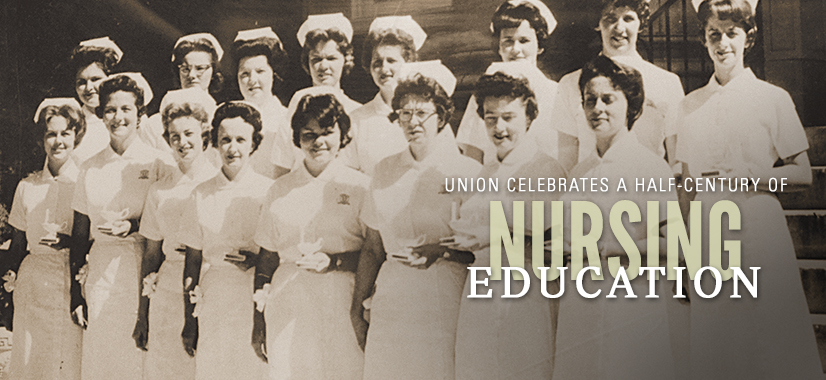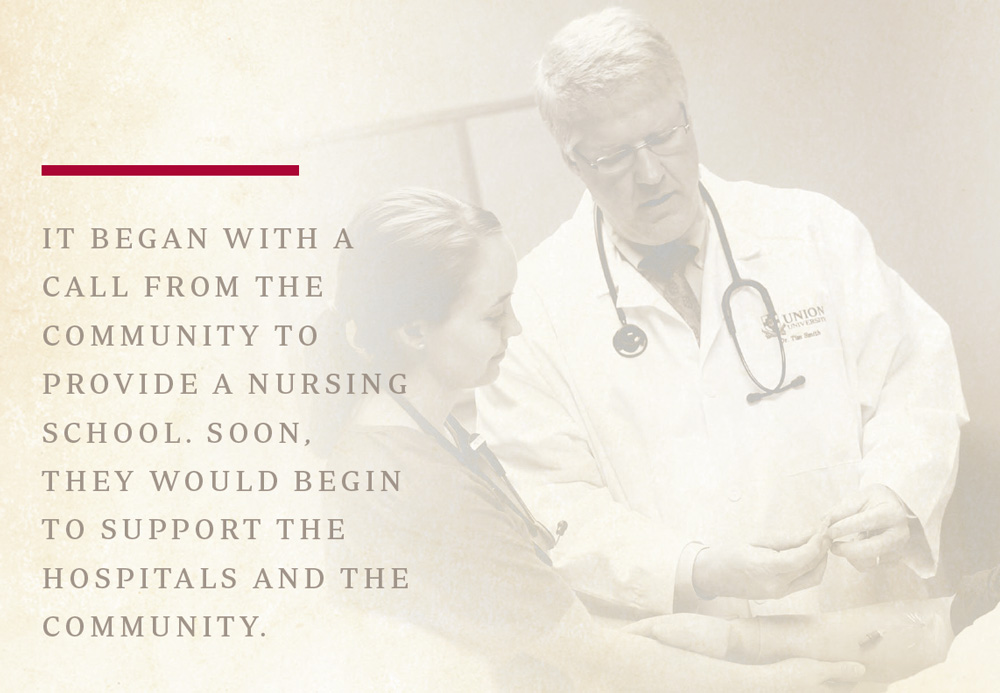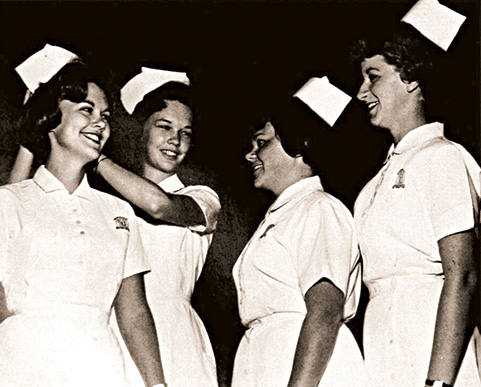Issue: Summer 2014 | Posted: June 2, 2014
Union Celebrates a Half-Century of Nursing Education

In the early 1960s, students who wanted to become nurses didn’t study on college campuses. They learned the profession in hospitals.
So when a few colleges and universities on the west coast began looking into establishing their own nursing education programs, it was a pioneering idea that caught the attention of administrators at Union University.
At the same time, health care leaders in Jackson were calling for larger numbers of trained nurses.
“It was a very bold move for our leaders in the late 1950s and early 60s. It was innovative,” said Carla Sanderson, former executive vice president for strategic initiatives and provost, as well as the former dean of the School of Nursing.
“It began with a call from the community to provide a nursing school,” added Tim Smith, former nursing dean. “Soon, they would begin to support the hospitals and the community.”
Those first classes, leading to an associate’s degree in nursing, began in 1964. The idea was so new that some were skeptical about whether it could be sustained—even a few of the enrolled students had doubts.
“You had somewhat of a feeling that it might not work,” said Dolores Moore, who was among the first students that year. “It was like the new animal came into town. Nobody knew what to expect, including those of us who decided to go.”
Moore personifies the significance of that venture—a significance that no one could have understood in 1964. After completing her associate’s degree, she went on to earn a B.S. from the University of Illinois and a master’s degree in administration from Illinois State.
She started her career as a nurse at Jackson General Hospital, moved away from Jackson and then returned 13 years later and became a nursing administrator. Prior to her retirement in 1991, she also served as chairwoman of the Board of Nursing of the State of Tennessee.
“In (the 1960s), it was the norm that wives followed their husbands,” Moore said, adding that the overwhelming majority of nurses at the time were women. “The bigger cities paid more, and it was very difficult to entice people from Memphis or Nashville where you could find experienced nurses.”
With those historic challenges in mind, the current leadership of West Tennessee Healthcare puts great emphasis on the role Union has played in the hospital’s growth in the past 50 years.
“Union has absolutely been a foundational block for health care delivery, particularly in the nursing program,” said West Tennessee Healthcare Chief Operating Officer J. R. Ross, who graduated from Union in 1987. “The education Union provides to its students is absolutely remarkable and unparalleled by any other educational institution locally.”

Union nursing programs combine quality faculty members with state-of- the-art simulation labs. Sanderson credits Smith with having the vision to incorporate simulation, in which students are faced with the same critical decisions that could make a life-or-death difference in a clinical setting.
“We’ve had alums, after experiencing simulation education, call back and say, two months out of school, ‘I just experienced my first code, and I was the most prepared person in that code,’” Sanderson said. “That is a profound difference from what those of us who did not have such (simulation) opportunities experienced.”
“Students are typically visual learners,” Smith said. “Students do make mistakes, but the opportunity to discuss those mistakes and not repeat those mistakes makes a big difference.”
Haley Bell, a senior nursing student from Memphis, agrees that her preparation for practice gives her confidence. But she admits that at her age, it’s difficult to comprehend the significance of 50 years of nursing education at Union.
“It’s incredible to think about how many patients have been affected because of the education provided by Union,” Bell said. “These professors care with all of their hearts about each and every student.”

